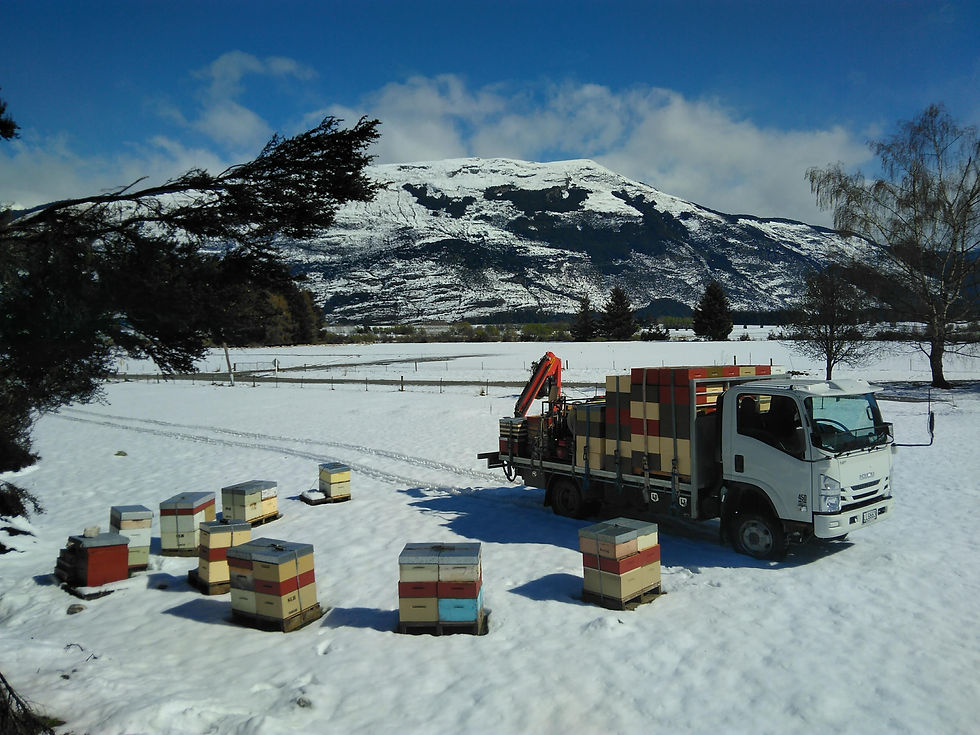Southland Beekeeper Wins AFB Compensation Claim
- Patrick Dawkins

- Mar 31
- 4 min read
George Bell’s first thought when he discovered American foulbrood (AFB) in his hives was not to gain compensation from a neighbouring hive-owner, but that was the eventuality following a terse interaction. Now, having gone through the process of detailed record keeping, identifying source of infection, and making a claim, the Te Anau beekeeper wants to warn non-compliant beehive owners about the risk their hives pose, while demonstrating there is a course for recompense.

It could have been “a different story” Bell says. He refers to the nature of his interaction with an offending neighbouring hive owner, but it is equally apt that the story might never have even started with better beekeeping practices.
“If he was a bit more reasonable and heard me out when I tried to explain how it had effected us, and allowed me to provide a bit of education, it could have been a different story. However, he was not at all reasonable. The Agency said he was horrible to them too,” Bell says.
The Agency is the AFB Pest Management Plan Management Agency, who provided a letter of support to Bell, having inspected all known neighbouring hives within a 1km radius following an AFB outbreak in his Southern Lakes Honey business.
Bell says the business, which has about 600 hives total and he took on in 2017, had been AFB-free under his management, and dating back 30 years according to the previous owner. However, in February 2024 an AFB spore count of 155 per gram was detected in a honey sample from 90 hives that season. Bell calls the count “very low”, but still a warning signal in an otherwise AFB-free business.
“I couldn’t find clinical AFB when I put strips in after the honey season. Then when I took the strips out, I still couldn’t find it. I did my last round the first week of April and no sign,” Bell says.
Come spring though, it was a different story.
“The first spring round was August 15 and I found nine cases of AFB and then five more September to November. All up 14 hives.”
Once confirmed, eradication and determining the source of infection were the next steps. Detailed record keeping, via management software, meant Bell knew the group of hives that had been on mānuka sites together during the previous honey season, despite them having spent winter and spring elsewhere.
“I wanted to make sure it didn’t come from within my own 90 hives that were together. I was pretty sure that it hadn’t, but I am part of the Southland Beekeepers Discussion Group that has used the Foster Method successfully so knew how it could help.”
The Foster Method is a form of environmental-DNA or qPCR sampling of hive entrances using a swab sample, invented by New Zealand lab dnature. When samples submitted to the lab from the 90 hives came back negative, the search moved beyond the Southern Lakes Honey hives.
“I asked around the farmers to find out if they had seen any hives and some had been seen at a group of lifestyle blocks. So, I got the binoculars out and found some pretty quick. I reported them and they were unregistered.”
The Agency carried out inspections and determined the presence of an AFB-infected hive that had been “robbed out” by nearby honey bees. Given the other registered apiaries within a 1km radius did not have AFB, the Agency concluded, in August 2024, the outbreak originated at this unregistered apiary and written notice of this was provided to Bell.

By this time, the Southland beekeeper says the infringing hive owner had acted aggressively to his approach, and the Agency’s attempts to enter his land to inspect, all while making no acknowledgement of his offending and illegal keeping of beehives. All beehives in New Zealand must be registered with the Agency, as set in law by the Biosecurity Act 1993.
“I asked a few beekeepers about it and spoke to the Management Agency to get advice. I was advised that the disputes tribunal was a valid option because he had broken the law by not registering hives and having a DECA (Disease Elimination Conformity Agreement) approved inspection. Complete negligence. Next step was legal advice and my lawyer thought it was pretty clear cut and recommended the disputes tribunal,” Bell says.
It never got as far as the Tribunal though. Bell and his lawyer drafted up a claim for costs of almost $20,000 made up of the value of infected hives destroyed (to that point), lost honey income for the upcoming season due to hive destruction, a batch of honey downgraded on price due to AFB spores, and the cost of hive testing.
“He came back pretty quick recognising he was wrong. I assume his lawyer told him he didn’t have a leg to stand on,” Bell says.

The final amount agreed on for compensation was just over $16,000. If business disruption and legal costs could be valued it would be much higher though, Bell says.
“It cost us more than that. Well over 20 grand when you consider the extra checking I have been doing, then I was hesitant to split the hives. It is hard to value.”
He also says the offending hive owner is lucky the batch of honey with AFB spores detected wasn’t of higher value mānuka honey.
With vigilant inspections this past beekeeping season, sound record keeping, and the help of the Foster Method of hive testing Bell believes he has stamped out the AFB outbreak in his hives and thus the ordeal has come to a close.
While he was initially hesitant to undertake a compensation claim, he recommends that other similarly impacted beekeepers consider it, especially when the offending hives are unregistered. Bell also thanked the Agency for their efforts to locate the source, destroy the hives, and support his claims.
“I was a bit nervous about it. I would hate to have it happen to me. It is not a nice thing to have happen,” Bell says, adding, “I did not enjoy it, but it is for the best for the industry.”









Comentarios